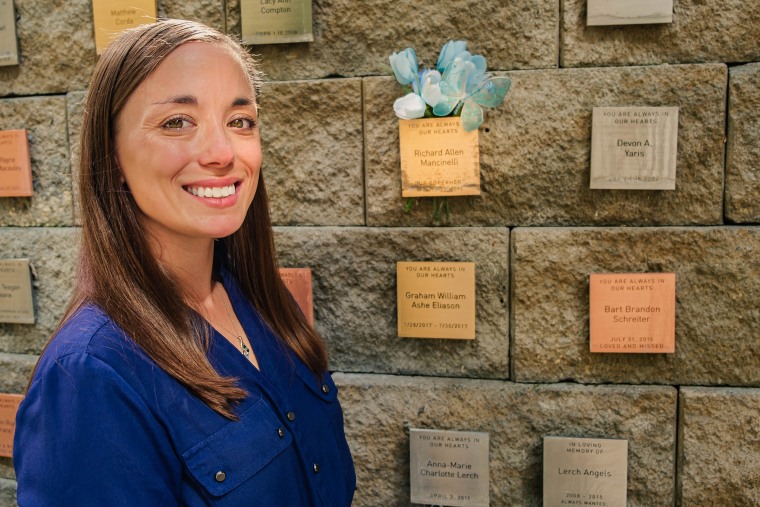When Cassidy Crough learned she was pregnant, she felt excited — and a little worried. She’d recently started a new job and wasn’t sure she’d qualify for maternity leave. But her employer told her that New York offers paid family leave, which would give her a percentage of her income during her time off with her baby, Olivia.
“(It) was great because I didn’t know how we would have been able to swing it,” the 34-year-old lawyer told TODAY Parents. “It was very stressful, starting a new job and being pregnant.”
At 36 weeks along in her pregnancy, Crough went in for a routine check-up and received devastating news from her doctor: Olivia had no heartbeat.
“It was literally the most horrific moment of my life,” she recalled.
After learning that Olivia had died, Crough began processing the fact that she still needed to deliver Olivia. On March 16, Crough gave birth. Then, after Olivia’s funeral, she reached out to the state to arrange for her paid leave.
Her request was denied. She said the insurance carrier told her she didn’t qualify for family leave because it’s reserved for parents bonding with their newborns.

“A mother buries their child that they carry nine months — when they go through all the physical aspects of birth and undergoing all the postpartum horrific symptoms that every other female goes through — and now you’re telling me that because my baby didn’t live I’m not entitled to the benefits?” Crough said. “(It) was an emotional slap in the face.”But Crough is hoping that her experience will spark a change and encourage the state to cover paid leave for parents of stillborn babies.
“It should be changed to ‘postpartum leave’ because that will encompass everyone that gives birth to a child. If you birth a child, whether it’s C-section or vaginal, you should be getting paid family leave because your body is undergoing a trauma,” she said. “It’s quite frankly a medical concern to have women returning to work before at least six weeks.”
Paid family leave in the United States
According to the Bipartisan Policy Center, a think tank in Washington, D.C., paid family leave is only offered in a handful of states including:
- California
- Massachusetts
- New Jersey
- New York
- Rhode Island
- Washington
- The District of Columbia
- Connecticut
The organization notes that Oregon, Colorado, Maryland and Delaware have paid family leave programs that have not yet gone into effect.
“We’re one of the only developed countries in the world that does not offer paid parental leave to all citizens and one of the few countries that doesn’t offer paid family caregivers and paid medical leave,” Adrienne Schweer, a fellow at the Bipartisan Policy Center and head of its Paid Family Leave Task Force, told TODAY Parents. “One in four moms is set to go back to work within 10 to 14 days of giving birth, which is outrageous.”

Only six countries in the world do not offer national paid parental leave and the United States is one of the six, according to the Bipartisan Policy Center. The paid parental leave that does exist in the U.S. varies by state and employer. Often the people who need it the most don’t have access to it.
“In some parts of the country, where workers might be struggling the most, where you have a lot of low-wage workers or rural workers, (people) are less likely to have access to paid family leave,” Schweer said. “Which is part of the reason why I work so hard on enacting a federal policy.”
California and New York have the longest-standing paid family leave laws, she said, but every state has different rules and considerations for what qualifies for paid family leave. That’s why one state might offer paid family leave for “chosen families,” while other states very specifically say paid leave is only for a blood relative or immediate family member.
Related story: These 2 moms lost their babies. Now they’ve teamed up to end preventable stillbirths
Stillbirth and paid parental leave
Crough is still dealing with the emotional and psychological aftermath of giving birth to a baby who had died.
“Knowing that she would never cry was just awful,” she said. “She came fast and furious — a couple of pushes and she was out. It was the proudest moment of my life because I was so proud to hold her and see how perfect she was for the first time. But it’s also the worst day of my life.”
When she learned she no longer qualified for family leave, Crough felt stunned. She was still physically recovering.
“Your body went through this great trauma but you don’t have a baby to care for,” she said. “I’d say (it was) four full weeks of bleeding, and lactation was probably about three weeks to get it to stop.”

Crough used bereavement leave and vacation time and said her employer has been supportive. Still, she wished she received the paid family leave.
“It really added to my grief and my depression and really made me feel as if New York state didn’t recognize that my baby was real,” Crough said.
Crough decided to speak up about her experience, and she met other moms of stillborn babies who had similar stories to share. In November 2020, Elizabeth O’Donnell learned her baby Aaliyah did not have a heartbeat. She delivered her stillborn a few days later. The public school teacher later learned she could not take leave or use the federal Family and Medical Leave Act.
“I thought maybe they were misunderstanding me and they thought I had a miscarriage,” said O’Donnell, 31, co-director of communications at PUSH for Empowered Pregnancy. “I was thinking, ‘I delivered a baby and I literally can’t walk so maybe they’re confused.’”
The Washington, D.C., resident used all her sick leave and returned to school in February 2021. But she also shared her experience on social media, which went viral.
“I was and still am so angry. I felt like these people were not recognizing the fact that my daughter was an actual full-grown baby,” she said. “That drove me to keep wanting to cause waves.”
Thanks to her advocacy, Washington, D.C., passed legislation that offers 10 days of bereavement leave.
“I keep saying to the D.C. council that it was very kind of you to do, but I’m not talking about bereavement,” she said. “I’m talking about: Does a woman not have a right in this country to heal her body after delivering a child? I guess the answer for some people is ‘no.’”
O’Donnell, who goes by Elizabeth Mayce on Instagram, founded Aaliyah in Action, a group that provides care packages and support for families coping with pregnancy and infant loss.
Jackie Mancinelli also felt motivated to act after the death of her son, Richard, shortly after his birth in 2016. Her organization, Start Healing Together, provides support and education about infertility as well as pregnancy and infant loss. When she learned she didn’t qualify for paid leave, she took unpaid leave and used up some savings to stay home to recover.
“I have two living children so I have been able to access the paid leave,” said Mancinelli, 34, a teacher from New Jersey. “It specifically states that you have to be caring for another, so they call it like newborn bonding time. Because my child had died, I was only caring for myself and I no longer qualified.”
O’Donnell said she hopes people might change the way they think about stillbirth and support families who are recovering from it.
“How are we as a country and employers going to respond with empathy to a mom?” she said. “I’m still a mom. I also feel like a lot of people think that because your child isn’t alive anymore that takes away your motherhood. It does not. But what are we going to do to make sure moms feel supported by their employer after a loss like this?”
Related essay: I will never stop being a parent, even though both my children have died
The women said they hope that changes to their states’ paid leave programs could help families experiencing stillbirth. But Mancinelli wonders if that’s enough.
“This needs to be addressed at the national level,” she said. “There is this expectation … you have to put your mental health and your grief on the back burner because you need to earn that paycheck.”
Related video: